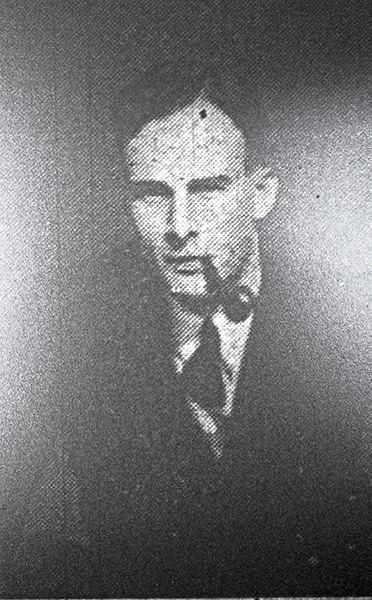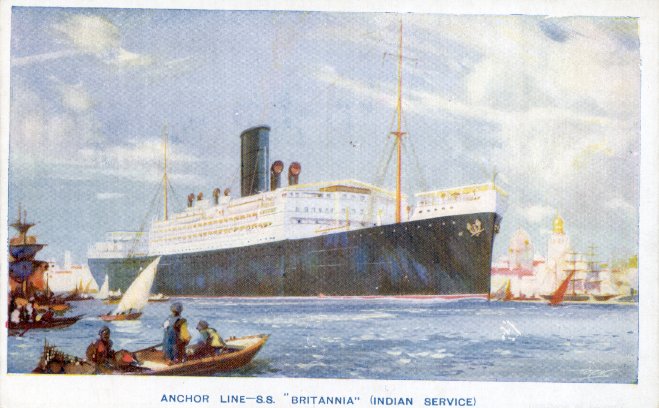
On the 25th of March of 1941 Terence H. Blank, the only son of Mr. And Mrs. F. W. Blank, of Launceston, was serving aboard the British steamer ‘S.S. Britannia’ (SS Britannia was a steam passenger ship built for Anchor Line by Alexander Stephen & Sons of Glasgow and launched in 1925) when she was attacked whilst off Freetown en route for Bombay by an armed German auxiliary cruiser ‘Thor’ and sunk with the loss of 122 crew and 127 passengers. He reluctantly retold his story to ‘The Cornish and Devon Post’ in July 1941 and here is the transcription of his ordeal cast at sea in a ship’s lifeboat.

‘When the Britannia (above) was intercepted by the German cruiser she made a gallant attempt to escape, and with the aid of a smoke screen managed to elude her pursuer for an hour, but emerging from the smoke screen, she found herself within range of the enemy’s guns. The order was given to take to the boats, and it was whilst this was being carried out that another salvo came over and Mr. Blank saw his close friend terribly mutilated and killed, and himself sustained a wound on the knee. Leaking badly owing to shrapnel, the lifeboat (only designed to carry 56 and measuring just 28 x 10 ft in size, with two sails and a rudder) got away crowded with 82 survivors, 44 of whom died before Brazil was reached, 1,530 miles away. Some died of wounds, others of exhaustion, and still others in agony caused by lack of water drank sea water and went mad, flinging themselves overboard. At different periods ships came into sight, and hopes rose, only to be replaced by despondency when it was realised that their efforts to attract attention had not been observed.
Eventually, after 23 days of suffering, land was sighted, and the following afternoon the boat was run on to sand. It was here, said Mr. Blank, that he came nearest to being drowned. For some distance two feet of water covered the sand, and most of the survivors were too weak to walk. Some covered the distance on hands and knees. Finding his water-logged coat too heavy, Mr. Blank discarded it whilst still in the water, and with it went the remainder of his personal belongings. He tottered and swayed on shaking (word not clear) legs to the dry sand, where he lay throughout the night. Later. A pool of fresh water was found, and crawling into it, he had his first long drink for three weeks.
The heat was terrific during the day but a native’s hut was found, and the occupant provided food, which they stuffed into their mouths with their hands. That night was spent in the hut, and a letter was sent out, “To anyone speaking English,” appealing for help. Late the next night a Police Commissar arrived, and after an amazing journey in an Indian canoe along jungle waterways and in cars on the wildest ‘track,’ the survivors arrived at San Luiz and were taken to the Portuguese Hospital. Here they were given the best of food and their salt water sores and wounds treated. Mr. Blank spoke in the highest terms of the treatment they received; nothing was too much trouble. The fruit was wonderful and Americans vied with each other in their generosity. Although he had lost three stones in weight, Mr. Blank says he soon began to recover. He spent five weeks in hospital and was then taken to Trinidad, later being taken to Bermuda.
FLEW BACK IN BOMBER.
Here he had what he looked upon as a wonderful piece of luck. He returned to England by air. He is now looking forward to the extra leave which he richly deserves. When he threw his coat away after the lifeboat had grounded, he also threw away his only available cash — £10.
The Spanish steamer ‘Bachi’ picked up another of the lifeboats with 63 people onboard.
___________________________________________
STORY TOLD IN LOG.
When ‘Britannia’ was attacked shortly before eight o’clock in the morning by the German armed merchant cruiser there was a plucky reply from the ship’s 4 inch gun mounted on the poop, but after about one and half hours the captain ordered “Abandon ship.” No. 7 lifeboat was successfully lowered and got away with 82 persons — 18 Europeans and 64 natives — several of whom were picked up from rafts. The boat ran before the wind on a southerly course, but was making water fast and energetic baling was necessary. From that day, March 25th, the log continues to give a day-to-day record of happenings.
HOPES RISE AND FALL.
March 26: Baled ceaselessly all night. Decided to make for coast of Africa, 600 miles. Endeavoured to sail north-eat into wind but unable to do so, and forced to change direction and sail to Brazil, 1,530 miles. Made good headway. Boat still leaking badly. Repairs carried out to three shrapnel holes. Sighted ship, six to eight miles away, but it did not see us. Sorted our personnel into groups, native crew in bow; native passengers amidships, Europeans in stern. Found we had the following food and water; Two breakers of fresh water holding six gallons each, 48 tins of condensed milk, two tins of biscuits. Decided to issue one-third dipper of water — about an egg cupful each — and one biscuit at sundown, and one tine of milk sunrise and one at sundown spread on biscuit.
NATIVES DRINK SEA WATER.
March 27: Saw another ship estimated seven — nine miles away, but it also failed to see us. Found small tank of fresh water holding about four gallons under a lower thwart. Natives seen drinking sea water and warned.
March 28: Saw steaming lights of another ship, but much too far away for them to see us. Natives now helped to bale. Arranged rota of duties for Europeans.
March 29: Several persons fainted during night. Placed oars across boat to separate Europeans from natives. Began washing by stripping to waist and laying over gunwale while others poured water with tins. Saw shoals of fish improvised fishing-hooks and spinners but no success.
March 30: Many had first sleep since leaving ‘Britannia. Estimated we had covered 299 miles. Had short service, hymns and prayers. Found difficulty in eating biscuits owing to great thirst.
March 31: Suspended usual baling during night and divided into three watches. Native chief cook threw himself overboard; he had been drinking sea water. Before breakfast tried making a mouthwash of milk and sea water.
WEAK AND EXHAUSTED.
April 1: Very restless night, so arranged for two men to be sleeping in most comfortable positions, changing every hour so that each had some rest. Several natives reported sick. Brought some round by douching with sea water. Heat terrific and all feeling very weak and exhausted.
April 2: Getting well westward and into S.E. Trade winds. Altered set of sail accordingly. Natives quarrelsome during night. Some are weak and crying out continuously for water. Made slight increase in evening water ration.
April 3: Weather very hot; we have to keep covered. All are getting saltwater boils and sores. Made alteration in evening food issue. Gave milk and water all round and biscuits only to those who asked. Many are now unable to swallow biscuit. Tried soaking biscuits in slat water, but not too sure of effect.
April 4: Two Europeans fainted during night, others very weak. Continuous bailing proving a strain in our weakened condition. Natives quarrelled badly during night. Heat very bad.
April 5: Several of native crew died during night. Many more weakening. Increased water ration and divided so as to have some in morning. Took mainsail down to catch rain water, but did not get enough rain.
THANKSGIVING FOR RAIN.
April 6: It rained last night and we lowered mainsail and tried to collect water, but natives spoilt our efforts. Two Englishmen died in early hours of morning. Heavy rain. Collect about two gallons, but again natives frustrate our efforts. All very cold, but refreshed. Lost steel helmet and dipper during storm.
April 7 : All feeling tired and weak. Had short service of remembrance for Englishmen who had died and thanksgiving for rain. Expect to make land about Good Friday (April 11). Had full cup of milk each at sundown.
April 8: Rained hard collected several gallons of water. Saw large freighter just before storm broke, but unable to attract attention. Had full cup of milk. Severe storm. Had to lower mainsail and run before wind, baling frantically.
April 9: Another Englishman and several natives died. Made slight increase in water ration.
April 10: No wind; little headway. Estimated we are near Equator. Several natives died during night, and many more very ill. Wind freshened during afternoon. Soaked biscuits wrapped in handkerchief in water tank to make more palatable. Saw oil tanker shortly before dusk steaming southwards. Short heavy storm; caught a little rain water.
ANOTHER SHIP PASSED.
April 11: Spent miserable night through being wet and cold. Another ship passed us, but we could only see its steaming lights. A native threw the bailing bucket overboard. Continued bailing with empty first-aid box and empty milk-tins. Speed estimated at four knots.
April 12: Did no bailing during night and had about a foot of water to remove at daylight. Emandel, native missionary died. Expect to reach land in about four days.
April 13: A good wind; good headway. Had extra milk ration for breakfast as it was Easter Sunday. Had several storms; caught a little rain water. Held a short service of prayer and Easter hymn. Another Englishman died.
April 14: Made excellent headway during night. At daylight made repairs; much bailing to do. Saw a seagull just before dusk which we consider a hopeful sign.
April 15: Considerable excitement this morning at dawn, for when the breeze came up it brought an ‘earthy’ land smell and water appeared a dirty shore green, and we saw some driftwood. Land was sighted at 11:40. By 16:00 we were running north-west along the coast, but unable to land owing to surf. Stood well out during night. Another Englishman died during the early hours of April 16.
LAND REACHED.
April 16: No sight of at dawn so altered course S.W. And again saw land at noon. Boat grounded at 16:00 and we all waded ashore. Made camp on beach.
April 17: Met by fishermen and taken to their huts; stayed with them, resting, eating, and sleeping. It was from here that a water-soaked envelope with the wording, “To anyone speaking English. Help please. Bearer can give direction,” was sent off, and inside was the following note: — “To anyone speaking English. Forty survivors of s.s. Britannia have got ashore and are urgently in need of assistance, having been afloat 23 days in a lifeboat. Could you please contact the nearest English Consul and arrange for assistance to be sent. The bearer has undertaken to give this to someone with knowledge of English. If possible, could you please arrange some help yourself if English Consul is very far away.”
According to a note signed by the British Vice-Consul this note was received at the British Vice-Consulate, N. Brazil, at 8:30 a.m. On May 18, 1941.
The ‘log’ continues:
April 18: Police Commissar arrived with interpreter. Made seven-hour journey through night in canoe to Mocajutuba, and then transferred to cars.
April 19: Arrived at Police station at San Luiz, and later went to Portuguese Hospital.
Visits: 121
